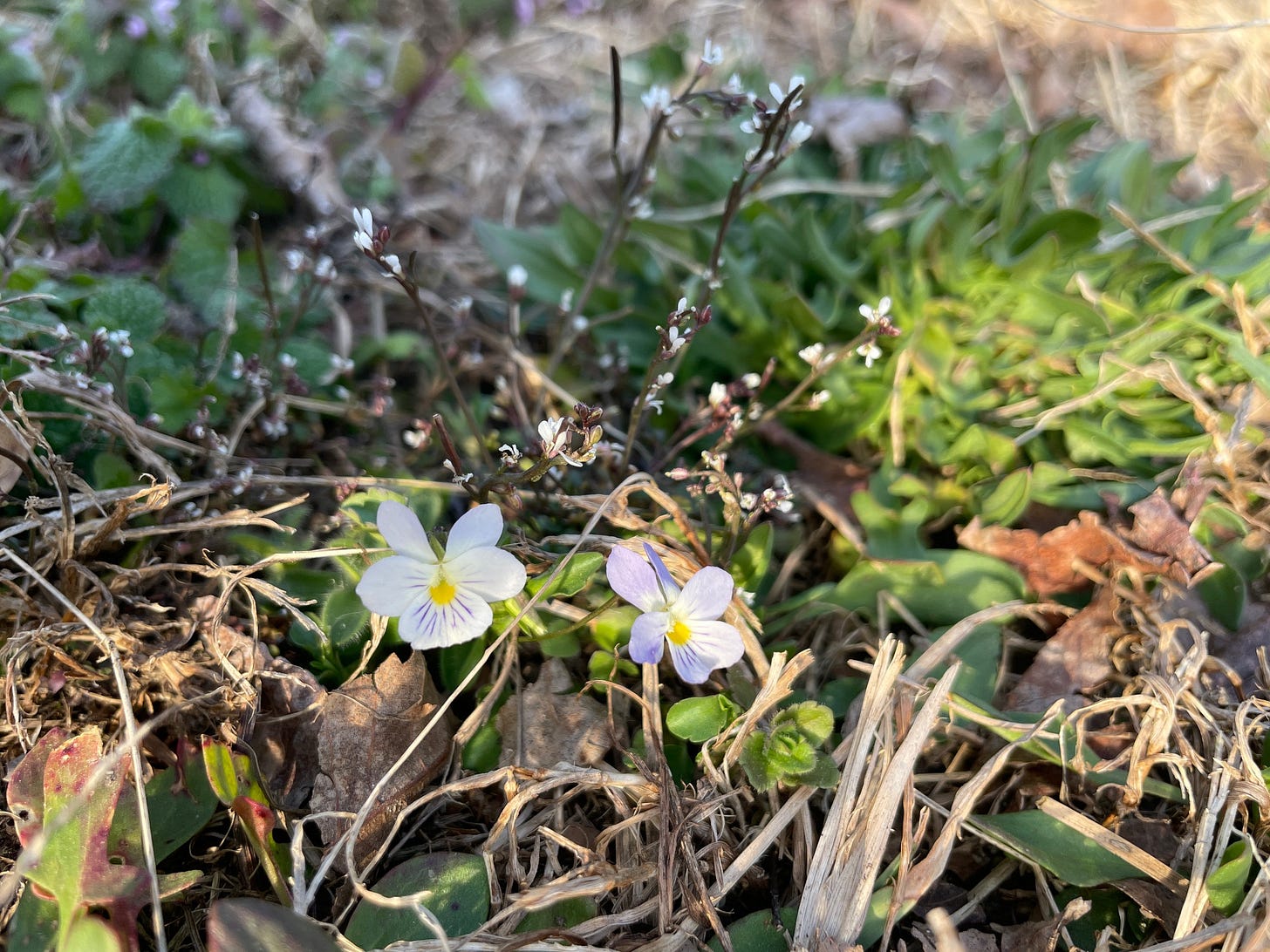Slow Change
Most of my time lately has been consumed with thinking about how we relate to each other. I think all of us are in some stage of recognizing how important community is, and yet most of us really struggle to form and maintain the relationships necessary to create that community. Decades of increasing isolation into the nuclear family unit and shuttering of third spaces have atrophied our collective knowledge of this skill.
Conflict resolution and relational repair are not skills effectively taught in school, and most of us certainly didn’t have good models in the homes we grew up in. It can be glacially slow work to make visible to ourselves the deeply ingrained patterns that we absorbed from our families and environments. Once revealed, there’s another mountain to move: disrupting those patterns in ourselves and forging new pathways.
It’s painful work. We are forced to reckon with the harm caused us when we were small, and how we undoubtably replicated that harm in our attempts to form bonds as adults. There is a lot of grief involved. It demands that we hold many things at once; we can mourn the lack of accountability from those who had power over us, and must retrieve that same accountability in ourselves. It can feel incredibly unfair to take responsibility for ourselves in relationships where we have been harmed, and the harm has not been acknowledged. For better or worse though, all we can change is ourselves.
I watched a talk last week from Thomas Hübl where he spoke about how building our skills of self-regulation in the face of stressful circumstances is truly world-building work. By being a co-regulating force in the presence of others, we create an ecosystem around us. He said, “Our ecosystem is the closest version to the world that we want to live in.” It’s a simple concept but difficult work. In its simplest form, you can think of it like a butterfly effect: you hold the door for someone carrying a package, they feel seen and cared for in that fleeting moment, they pass on that positive energy to another, and so on.
Hübl stresses that this sort of change can’t happen just from having good ideas about how to interact and relate—we have to actually put it into practice. Obvious, and yet quite challenging, particularly when we’re faced with someone who tweaks all of our wounds. I think a lot of us understand the golden rule (treat others as you would wish to be treated) intellectually, but are pretty bad at really doing it. It becomes a sort of withholding game: I’ll treat you how I’d like to be treated once you treat me that way first. We’re going to be waiting a long time.
None of this is to say that we must interact with people who actively cause us harm. There is a line at which voluntarily subjecting ourselves to someone’s vitriol isn’t going to win us any saint points and just becomes self-destructive. It’s not possible to avoid all negative interactions; it’s not possible to always present as our ideal selves. But if we have a choice to engage, and we know that all that interaction is going to do is disregulate and agitate us without benefit or growth, I think it’s acceptable to decline.
On the flip side, this isn’t an excuse to cut out every person who pokes your ouchy spots. Avoidance is just as harmful as acceptance of any kind of treatment. Both extremes indicate a lack of boundaries within ourselves as we relate to others. We don’t trust ourselves to respond how we would like, so we just take it (common among those of us with people-pleasing tendencies), or run away from it.
Fragments of a quote I heard in childhood have been flitting around my brain and I finally looked it up to find that it is attributed to Rabbi Yisrael Lipkin:
"When I was a young man, I wanted to change the world. I found it difficult to change the world, so I tried to change my nation. When I found I couldn't change the nation, I began to focus on my town. I couldn't change the town, so, as an older man, I tried to change my family. Now, as an old man, I realize that the only thing I can change is myself. And suddenly I realize that if, long ago, I had changed myself, I could have made an impact on my family. My family could have made an impact on our town. The town's impact could have changed the nation, and I could indeed have changed the world.”
Lipkin’s teachings emphasized becoming aware of one’s subconscious motivations in order to understand them and shift how we respond in heightened situations. He talks of how one should do this work in times of emotional quietude, rather than trying to tackle it in a heated moment. This is in line with the guidance of many therapists, and the increasing understanding of the vagus nerve and its role in parasympathetic nervous system regulation.
Hübl spoke of how self-regulation is not a self-centered practice, but a practice for ourselves that has an immediate positive effect on our ecosystem. For me, recognizing that the only change I can effect is upon myself has involved a bit of ego death. The fact that no amount of well-researched facts or emotional tirades about how things should be or what people should believe will change them has forced me to reckon with my own hubris.
As Rumi said, (in a more succinct version of the above) “Yesterday I was clever, so I wanted to change the world. Today I am wise, so I am changing myself.”




